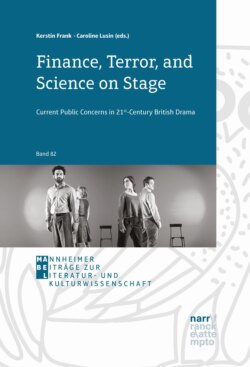Читать книгу Finance, Terror, and Science on Stage - Группа авторов - Страница 23
На сайте Литреса книга снята с продажи.
7. Conclusion
ОглавлениеIn the present context, Richard Bean’s play is interesting for three reasons: its attempts to represent the diversity of responses to immigration today, its ambition to highlight continuities and differences of these responses, and the fact that it does so by harnessing an array of formal devices from the history of drama. First and foremost among these is the farce; to have shown the continuing appeal of the genre when it is combined with satire, without degenerating into agitprop, is a genuine achievement. The same goes for the synchronisation of farcical plot structures and social commentary: the four love stories, the repeated threats, the running gags and dreams of paradise all point to a ‘natural’ progression of immigration and assimilation that is predictable, harmless, and ultimately successful and beneficial to all concerned. The playwright’s technique of combining politically incorrect jokes with more traditional means of generating comedy, including slapstick and other visual forms of humour, underscores this. At this point, it is hard to agree with the critics who saw offence given to many ethnic groups. Where everybody, including the English, come under the same type of provocation, insult can indeed turn into entertainment. The problem with this type of blanket invective is therefore not so much its potential to hurt but the lack of debate that goes with it. Bean does not stop here, though. The last act, and therefore the second half of the play, introduces points not made before. The violence both on- and offstage escalates – the individual fights and even lynchings of the previous acts have given way to terrorist attacks, gang warfare and divisive hate speech. This time, Bean seems to say, things are different. There is nothing funny about the young generation’s rhymed calls to resistance. The rivers of blood have become reality.
Characteristically, this is not the ending of the play. One of the love stories endures:
LAURIE. […] What is the greatest love story ever told? Romeo and Juliet? Elizabeth Bennet and Colin Firth. No. Harvey Kleinman and Ida Houlihan. Why? Cos theirs was an impossible love, a forbidden love. They didn’t even know it was wrong.
RENNIE. They got competition now – Deborah and Mushi.
At LAURIE. Debs is only following in her mother’s footsteps. Ida was the pioneer. The first. The Sherpa Tenzing of cross cultural romance. All these different faiths, why do they wanna live separate? They’re scared. They fear the power of love, because love laughs at the manufactured made up madness of religion and culture. (113)
“All you need is love” – the same sentiment is regularly expressed by mourners in the aftermath of suicide bombings, and perhaps it is true. Bean’s frame play, at any rate, ends with the deportation of some of the actors; at the end of the inset play the first Somalis arrive. The story of immigration will go on.
